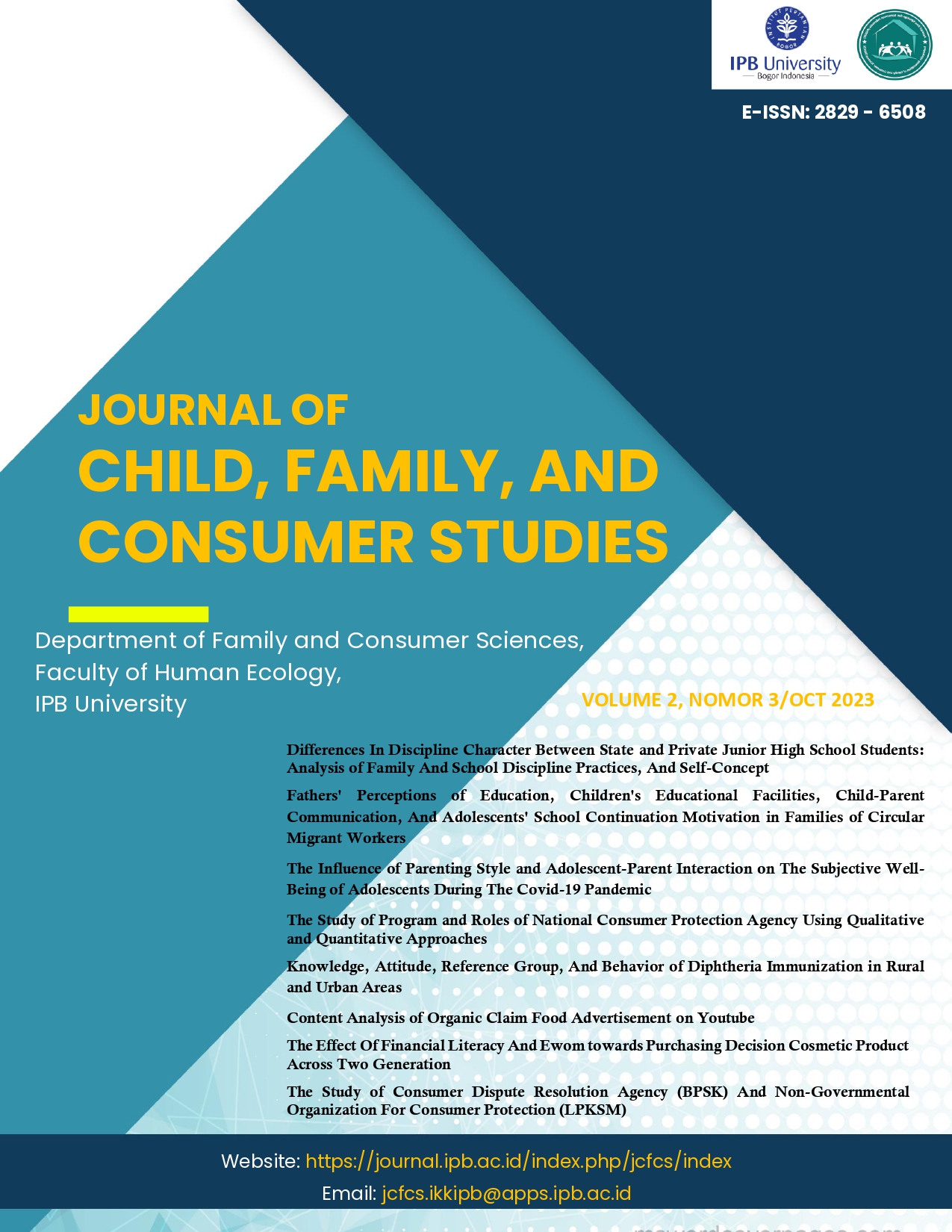THE INFLUENCE OF PARENTING STYLE AND ADOLESCENT-PARENT INTERACTION ON THE SUBJECTIVE WELL-BEING OF ADOLESCENTS DURING THE COVID-19 PANDEMIC
Abstract
The COVID-19 pandemic had a considerable impact on adolescents, including reducing adolescents activities outside the home, conducting schools online and increasing stress. This study aims to analyze the effect of parenting styles, and adolescent interactions with parents on the subjective well-being of adolescents during the COVID-19 pandemic. Research respondents were grade 12 students of SMKN 2 and SMKN 3 Bangkalan. Sampling technique using simple random sampling method with a total sample of 197 adolescents. The results of the study found that there were differences in the subjective well-being of adolescents, namely lower subjective well-being during the COVID19 pandemic. Based on the results of the study, adolescent age was significantly negatively related to the subjective well-being of adolescents before the COVID-19 pandemic. The education of father and mother is significantly positively related to adolescent-mother interaction. Adolescent age, family size, and authoritarian parenting style have a significant negative effect on the subjective well-being of adolescents before the COVID-19 pandemic. Permissive, authoritarian parenting styles, and adolescent interactions with fathers have a significant positive effect on adolescents' subjective well-being during the COVID-19 pandemic.
References
Berlianti, D., Vitalaya, A., Hastuti, D., Sarwoprasojdo, S., & Pranaji, D. K. (2016). Ada Apa dengan Komunikasi Orang Tua-Remaja?: Pengaruhnya terhadap Agresivitas Remaja Pada Sesama. Jurnal Ilmu Keluarga Dan Konsumen, 9(3). https://doi.org/10.24156/jikk.2016.9.3.183
[BKKBN] Badan Kependudukan dan Keluarga Berencana Nasional. (2005). Keluarga Berencana dan Kesehatan Reproduksi.
[BKKBN] Badan Kependudukan dan Keluarga Berencana Nasional. (2011). Batasan dan Pengertian MDK.
Buri, J. R. (1991). Parental Authority Questionnaire. Journal of Personality Assessment, 57(1). https://doi.org/10.1207/s15327752jpa5701_13
Chulani, V. L., & Gordon, L. P. (2014). Adolescent Growth and Development. Primary Care-Clinics in Office Practice, Vol. 41. https://doi.org/10.1016/j.pop.2014.05.002
Cummins, R. A., & Lau, A. L. D. (2005). Personal Wellbeing Index-School Children (PWI-SC), 3rd Edition. Deakin University.
Dewi, L. A. A. (2015). Pengaruh Interaksi Orang tua-Remaja dan Pengambilan Keputusan Keluarga terhadap Kenakalan Remaja.
di Maggio, R., & Zappulla, C. (2014). Mothering, Fathering, and Italian Adolescents’ Problem Behaviors and Life Satisfaction: Dimensional and Typological Approach. Journal of Child and Family Studies, 23(3). https://doi.org/10.1007/s10826-013-9721-6
Foa, R., Gilbert, S., & Fabian, M. O. (2020). COVID-19 and Subjective Well-Being: Separating the Effects of Lockdowns from the Pandemic. SSRN Electronic Journal. https://doi.org/10.2139/ssrn.3674080
Gimenez-Serrano, S., Garcia, F., & Garcia, O. F. (2021). Parenting styles and its relations with personal and social adjustment beyond adolescence: Is the current evidence enough? European Journal of Developmental Psychology. https://doi.org/10.1080/17405629.2021.1952863
Hastuti, D. (2015). Pengasuhan: Teori dan prinsip serta aplikasinya di Indonesia. Bogor: IPB Press.
Hurlock. (1980). Psikologi Perkembangan; Suatu Pendekatan Sepanjang Rentang Kehidupan (edisi kelima). Jakarta: Erlangga.
Lampropoulou, A. (2018). Personality, school, and family: What is their role in adolescents’ subjective well-being. Journal of Adolescence, 67. https://doi.org/10.1016/j.adolescence.2018.05.013
Möhring, K., Naumann, E., Reifenscheid, M., Wenz, A., Rettig, T., Krieger, U., … Blom, A. G. (2021). The COVID-19 pandemic and subjective well-being: longitudinal evidence on satisfaction with work and family. European Societies, 23(S1). https://doi.org/10.1080/14616696.2020.1833066
Oriol, X., Torres, J., Miranda, R., Bilbao, M., & Ortúzar, H. (2017). Comparing family, friends and satisfaction with school experience as predictors of SWB in children who have and have not made the transition to middle school in different countries. Children and Youth Services Review, 80. https://doi.org/10.1016/j.childyouth.2017.06.053
Pavicevic, M. S., & Zivcovic, T. L. (2021). Parenting Styles as Predictors of Adolescents’ Self-Efficacy and Subjective Well-Being. Stanisław Juszczyk, 29.
Pratiwi, I., Hastuti, D., & Muflikhati, I. (2018). Penyesuaian Keluarga, Pengasuhan, Kekerasan dalam Pengasuhan, dan Agresivitas pada Anak Usia Sekolah. Jurnal Ilmu Keluarga Dan Konsumen, 11(3). https://doi.org/10.24156/jikk.2018.11.3.181
Sari, I. P., Riyono, B., & Supandi, A. (2020). Indeks Pembangunan Manusia di Madura: Analisis Tipologi Klassen. JABE (Journal of Applied Business and Economic), 6(2). https://doi.org/10.30998/jabe.v6i2.4578
Schnettler, B., Miranda-Zapata, E., Lobos, G., Saracostti, M., Denegri, M., Lapo, M., & Hueche, C. (2018). The mediating role of family and food-related life satisfaction in the relationships between family support, parent work-life balance and adolescent life satisfaction in dual-earner families. International Journal of Environmental Research and Public Health, 15(11). https://doi.org/10.3390/ijerph15112549
Tian, L., Tian, Q., & Huebner, E. S. (2016). School-Related Social Support and Adolescents’ School-Related Subjective Well-Being: The Mediating Role of Basic Psychological Needs Satisfaction at School. Social Indicators Research, 128(1). https://doi.org/10.1007/s11205-015-1021-7
Tomás, J. M., Gutiérrez, M., Pastor, A. M., & Sancho, P. (2020). Perceived Social Support, School Adaptation and Adolescents’ Subjective Well-Being. Child Indicators Research, 13(5). https://doi.org/10.1007/s12187-020-09717-9
Wang, Z., Kouvonen, A., Satka, M., & Julkunen, I. (2019). Parental Social Support and Adolescent Well-Being: a Cross-Sectional Study in China. Child Indicators Research, 12(1). https://doi.org/10.1007/s12187-018-9547-2
Wijayanti, R., Sunarti, S., & Krisnatuti, D. (2020). Peran Dukungan Sosial dan Interaksi Ibu-Anak dalam Meningkatkan Kesejahteraan Subjektif Remaja pada Keluarga Orang Tua Bekerja. Jurnal Ilmu Keluarga Dan Konsumen, 13(2). https://doi.org/10.24156/jikk.2020.13.2.125
Xie, Q., Fan, W., Wong, P., & Cheung, F. M. (2016). Personality and Parenting Style as Predictors of Life Satisfaction Among Chinese Secondary Students. Asia-Pacific Education Researcher, 25(3). https://doi.org/10.1007/s40299-015-0271-0










